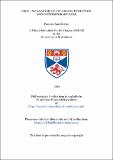CSCE - an analysis of its origin, evolution and contemporary role
Abstract
The collapse of East European communism and the subsequent collapse of the Berlin Wall in November 1989, challenged the status quo in Europe. Ideas of a "New World" order, and of a "New European Architecture" proliferated. Immediate calls from the new States of Czechoslovakia and Hungary as well as the Soviet successor States were for the CSCE, (The Conference on Security and Cooperation in Europe) to be the foundation structure on which to build a new pan-European security community. The purpose of this thesis is chart the origins and evolution of the CSCE, and its contemporary role in the undivided Europe. Chapter One initially looks at the post war condition in Europe and then the steps leading to the agreement to hold multilateral preparatory talks, which would seek to reduce tensions and enhance security in Europe. Chapter Two addresses the subsequent talks which ran for almost two years, from August 1973 until the Helsinki Final Act was signed in August 1975. Chapter Three charts the Follow up Mechanism of the Conference, this was the means by which the process was to survive to play its extended role in contemporary Europe. Chapters Four and Five address the Paris Meeting of Heads of State, and Governments in November 1990, and the Helsinki Follow up Meeting of 1992. Dealing with post Berlin Wall issues, including the formal ending of the Cold War, and setting in place the means to revitalize and institutionalize the CSCE. Chapter Six deals with the Third Council of Ministers Meeting of the CSCE at Stockholm, outlining how this newly created decision making body of the CSCE moves forward the decision making process. The final chapter, addresses the contemporary role of CSCE, its place vis-a-vis other European security organizations, and the position of CSCE in the immediate future.
Type
Thesis, MPhil Master of Philosophy
Collections
Items in the St Andrews Research Repository are protected by copyright, with all rights reserved, unless otherwise indicated.

